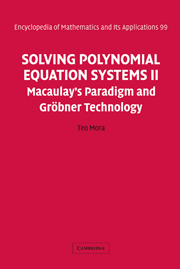26 - Spear
from Part three - Gauss, Euclid, Buchberger: Elementary Gröbner Bases
Published online by Cambridge University Press: 05 June 2013
Summary
Buchberger's results, which are dated 1965 (his Ph.D. thesis) and 1970 (his journal publication), became known within the computer algebra community around 1976; at the same time David A. Spear was implementing, in MACSYMA, a package allowing the solution of ideal (and subring) theoretical problems within commutative rings.
This package was already ahead of most of the recent commonly used, specialized software in commutative algebra, covering classes of rings which are even only partially available in modern software: the classes of rings available covered at least quotient rings of a polynomial ring over any field represented in the Kronecker Model!
While the report of this package contains no documentation, fortunately many of the ideas embedded there soon became available within the research community.
In particular, Zacharias' results (Section 26.1) hint that Spear's notion of admissible rings required at least algorithms for syzygy computation, membership test and membership representation, the tool for lifting such algorithms from R to R [X1,…, Xn] being essentially Gröbner technology.
The relation between Buchberger's result and Spear's own is presented by Spear in his report as follows: The solution to each of the problems described above depends on a fundamental algorithm for expressing ideals in a canonical form.
Information
- Type
- Chapter
- Information
- Solving Polynomial Equation Systems IIMacaulay's Paradigm and Gröbner Technology, pp. 289 - 332Publisher: Cambridge University PressPrint publication year: 2005
